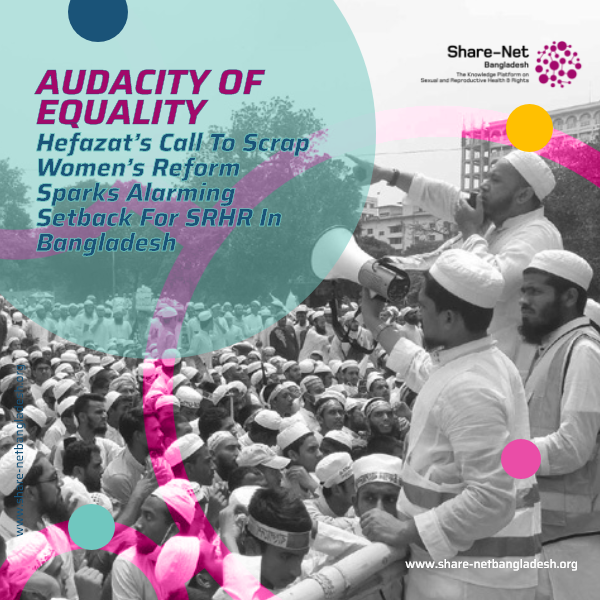Audacity of Equality: Hefazat’s Call to Scrap Women’s Reform Sparks Alarming Setback for SRHR in Bangladesh
On 3 May 2025, Hefazat-e-Islam staged a massive rally in Dhaka’s Suhrawardy Udyan, calling for the immediate abolition of the Women’s Affairs Reform Commission, igniting concern among women’s rights advocates, policy experts, and SRHR campaigners across the country.
Branding the reform efforts as “anti-Islamic” and “mentally sick,” Hefazat leaders openly challenged the legitimacy of the Commission, which had been tasked with proposing long-overdue legal and structural reforms aimed at improving sexual and reproductive health and rights (SRHR), gender equity, and institutional protections for women.
“We want to make our demand clear – the report published in the name of women’s reform has to be thrown into dustbin with its proponents,” declared Maulana Abdul Awal, one of the group’s senior leaders.
Hefazat has also announced nationwide demonstrations on 23 May to press for their 12-point charter, with the abolition of the Women’s Reform Commission topping their list.
This rising wave of religious pushback highlights the growing tension between hardline religious actors and progressive SRHR policies in Bangladesh. While the Commission’s proposals have not been publicly released in full, early indications suggest they address crucial issues, including ending child marriage, ensuring access to reproductive health services, and legal protections for survivors of gender-based violence—reforms that are vital in a country where 51.2% of women aged 20–24 were married before age 18 (UNICEF, 2023).
Hefazat’s rhetoric has been particularly harsh, accusing the Commission’s members of lacking faith and branding them enemies of Islam. “In a nation with Islamic values, a women’s reform commission cannot be established by anti-Islamic people,” said Junaid Al Habib, Hefazat’s Dhaka unit head.
Women’s rights groups argue that such extreme positions are a dangerous attempt to roll back decades of advocacy and constitutional progress on gender equality. “This is not just about one commission—this is about who gets to decide how women live, work, and access health care,” said a representative from a Dhaka-based SRHR NGO.
The backlash also signals how religious bigotry threatens to derail state efforts to uphold the sexual and reproductive rights of half the population. Experts warn that if the government gives in to pressure, Bangladesh’s commitments to international frameworks like CEDAW, ICPD, and SDG 5 on gender equality will be severely compromised.
In a nation where maternal mortality remains a concern (173 deaths per 100,000 live births, WHO 2023), any step back from institutional reforms will have a direct impact on women’s access to life-saving sexual and reproductive health services.
As the country braces for Hefazat’s upcoming demonstrations, all eyes are now on the government—whether it will protect the principles of gender justice or fold to religious hardliners.
Source: The Business Standard


